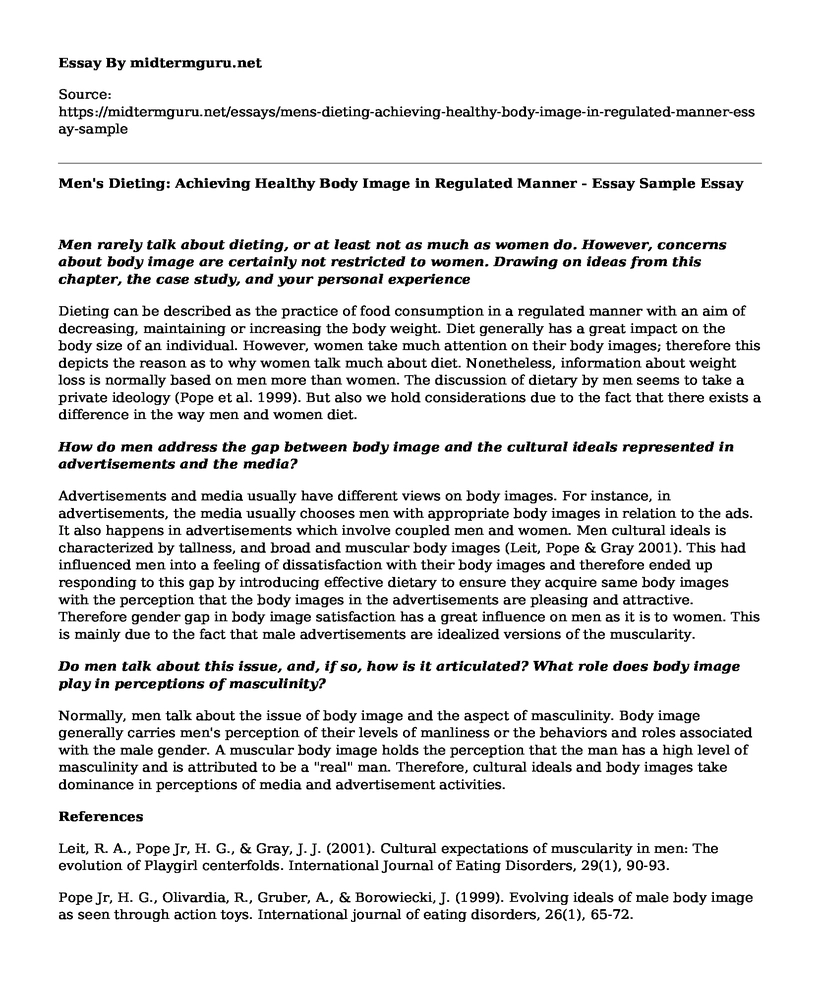Men rarely talk about dieting, or at least not as much as women do. However, concerns about body image are certainly not restricted to women. Drawing on ideas from this chapter, the case study, and your personal experience
Dieting can be described as the practice of food consumption in a regulated manner with an aim of decreasing, maintaining or increasing the body weight. Diet generally has a great impact on the body size of an individual. However, women take much attention on their body images; therefore this depicts the reason as to why women talk much about diet. Nonetheless, information about weight loss is normally based on men more than women. The discussion of dietary by men seems to take a private ideology (Pope et al. 1999). But also we hold considerations due to the fact that there exists a difference in the way men and women diet.
How do men address the gap between body image and the cultural ideals represented in advertisements and the media?
Advertisements and media usually have different views on body images. For instance, in advertisements, the media usually chooses men with appropriate body images in relation to the ads. It also happens in advertisements which involve coupled men and women. Men cultural ideals is characterized by tallness, and broad and muscular body images (Leit, Pope & Gray 2001). This had influenced men into a feeling of dissatisfaction with their body images and therefore ended up responding to this gap by introducing effective dietary to ensure they acquire same body images with the perception that the body images in the advertisements are pleasing and attractive. Therefore gender gap in body image satisfaction has a great influence on men as it is to women. This is mainly due to the fact that male advertisements are idealized versions of the muscularity.
Do men talk about this issue, and, if so, how is it articulated? What role does body image play in perceptions of masculinity?
Normally, men talk about the issue of body image and the aspect of masculinity. Body image generally carries men's perception of their levels of manliness or the behaviors and roles associated with the male gender. A muscular body image holds the perception that the man has a high level of masculinity and is attributed to be a "real" man. Therefore, cultural ideals and body images take dominance in perceptions of media and advertisement activities.
References
Leit, R. A., Pope Jr, H. G., & Gray, J. J. (2001). Cultural expectations of muscularity in men: The evolution of Playgirl centerfolds. International Journal of Eating Disorders, 29(1), 90-93.
Pope Jr, H. G., Olivardia, R., Gruber, A., & Borowiecki, J. (1999). Evolving ideals of male body image as seen through action toys. International journal of eating disorders, 26(1), 65-72.
https://www.youtube.com/watch?list=PL5HXt9kxGGrox91ESM1Gss6vGWghLHD_&v=dziLHmRuDQs
Cite this page
Men's Dieting: Achieving Healthy Body Image in Regulated Manner - Essay Sample. (2023, Jan 09). Retrieved from https://midtermguru.com/essays/mens-dieting-achieving-healthy-body-image-in-regulated-manner-essay-sample
If you are the original author of this essay and no longer wish to have it published on the midtermguru.com website, please click below to request its removal:
- Articles Analysis Essay on Depression
- Nutritionist Job Research Paper
- Paper Example on Self-Assessment for Leadership
- Paper Example on Bipolar Disorder
- Essay Sample on Attention Deficit Hyperactive Disorder: Therapy vs. Medication
- Critical Essay on The Global Grapevine: Why Rumors of Terrorism, Immigration, and Trade Matter
- Cultural Relativism & Morality: Comparing Rachels & Benedict - Essay Sample







